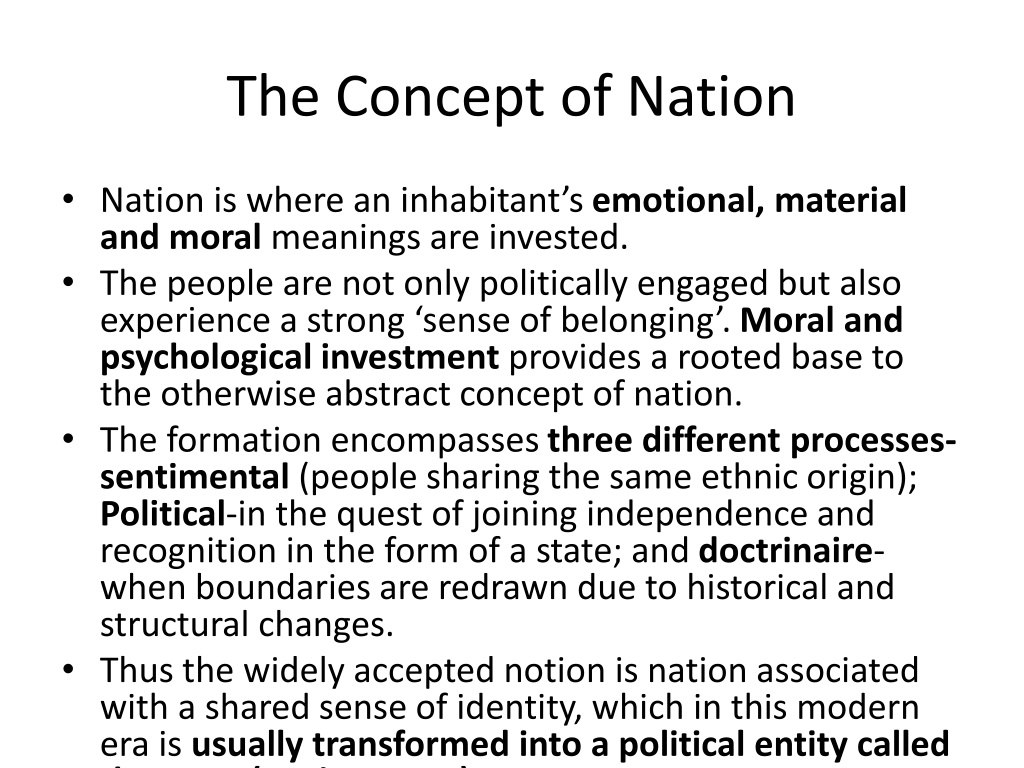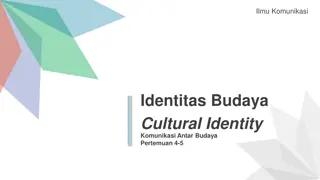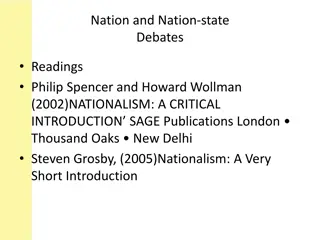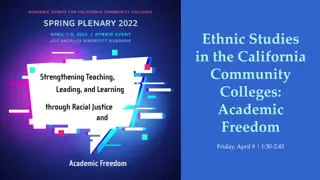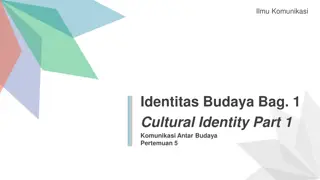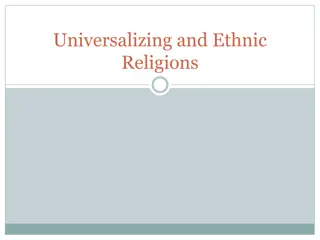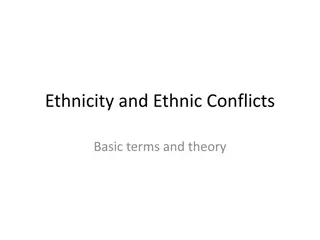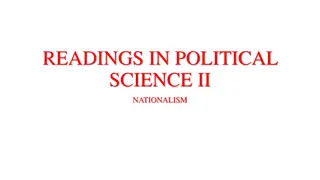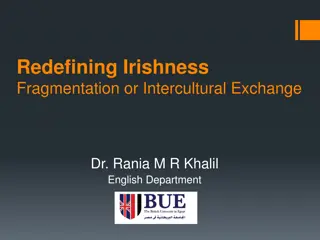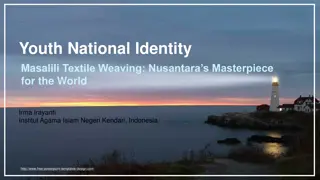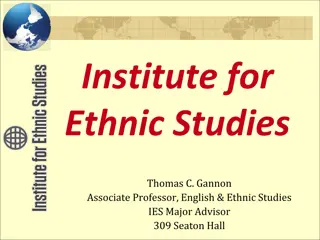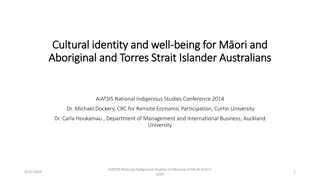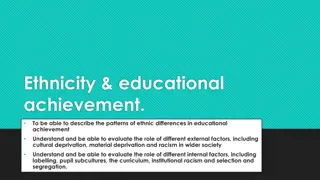The Concept of Nation and Ethnic Identity
The concept of nation is deeply rooted in emotional, material, and moral investments, leading to a strong sense of belonging. Various scholars present different perspectives on nationhood, from sentimental and political processes to the debate on whether a nation is a political or cultural entity. Nations are seen as more than just legal and territorial entities, with a focus on subjective psychological identification and cultural values. Modern discussions also highlight the idea of nations as invented traditions.
Download Presentation

Please find below an Image/Link to download the presentation.
The content on the website is provided AS IS for your information and personal use only. It may not be sold, licensed, or shared on other websites without obtaining consent from the author. Download presentation by click this link. If you encounter any issues during the download, it is possible that the publisher has removed the file from their server.
E N D
Presentation Transcript
The Concept of Nation Nation is where an inhabitant s emotional, material and moral meanings are invested. The people are not only politically engaged but also experience a strong sense of belonging . Moral and psychological investment provides a rooted base to the otherwise abstract concept of nation. The formation encompasses three different processes- sentimental (people sharing the same ethnic origin); Political-in the quest of joining independence and recognition in the form of a state; and doctrinaire- when boundaries are redrawn due to historical and structural changes. Thus the widely accepted notion is nation associated with a shared sense of identity, which in this modern era is usually transformed into a political entity called the state (Nation-state).
Ethnonationalism: Walkar Connor Walkar Connor, in his work Ethnonationalism: the Quest for Understanding (1994), claims that states are legal and territorial entities and generally multi-national. Nations are self-differentiating ethnic group at whose core is an intensely subjective psychological identification, which exists beyond reason.
Max Weber: Prestige Community Another popular interpretation is by Max Weber, a nineteenth-century German sociologist, who defines nation in terms of a prestige community and argues that the nation derives both from the material interest of the state and a sense of irreplaceable cultural values propounded by intellectuals. He strongly opposes the objective basis of a nation, that is, vernacular language, blood and common descent, while agreeing with the subjective basis of a nation, that is, the sentiment quotient. Thus, he believes that the nation, being a community of sentiment, would lead to the creation of a state on its own-e.g. Jews and the formation of Israel.
Nation is a Political or Cultural Entity: the Debate Whether nation is a political or cultural entity remains debatable. Anthony D. Smith, in The Ethnic Origins of Nations (1986), distinguishes between the relationship shared by nationalism and modernization. Smith believes, ethnies or pre-modern ethnic communities that are bound by a common culture and language to be the parental node of modern nations. So according to him, these culturally rooted ethnies that are embedded in heritage evolved into modern nations when they came in contact with the doctrine of sovereignty. This juxtaposition occurred in Europe in the late eigthteenth and early nineteenth century, and in Asia and Africa in the twentieth century.
Eric Hobsbawm: Nations as Invented Traditions Modern thinkers such as Eric Hobsbawm in Nations and Nationalism Since 1780 (1990) have emphasized the extent to which nations are invented traditions , rather than accepting the traditional thinker s belief that modern nations have grown and become urbanized out of time-honoured ethnic communities. However, the notion that a nation is a conglomeration of various cultural streams is a more popular belief, and has been endorsed by most thinkers. Nevertheless, the political connotation attached to the word nation cannot be dismissed completely.
Political and Cultural Aspects of Nation: Intertwined A German historian, Fredrich Meinecke, even attempted to present a difference between a political nation and a cultural nation in his book Cosmopolitanism and the Nation State (1907). Still, the fact that they are interdependent and intertwined makes it difficult to choose either one. Thus from the ongoing discussion, it is quite evident that the birth of a nation is certainly not a sudden occurrence, but a gradual process. It is true that nations are organic (natural) units bound together by cohesive cultural traditions and historical processes, which make them relatively more stable than any political structure.
Nationalism The consciousness encompassing one s close affinity to one s nation indicates a sense of belongingness or loyalty towards a particular community or social group, and this national consciousness often gets transformed into the concept of the nation. A modern nation represents multiple aspects of the human personality. Ideas are nurtured through a particular language, culture, habits and lifestyle, as well as aspirations and sentiments. So the saying, the state dictates whereas the nation adopts. Over the passage of time, a nation either transforms into a state or a state graduates into a nation-state due to social, ethnic and cultural factors, besides political aspirations. Hence, a nation-state s prime role remains to nurture cultural confluence and strengthen political unity.
Nationalism and Patriotism Nationalism is the motivating factor in modern politics because the modern state is truly a nation-state. Within the Asian panorama, the Indian freedom struggle is a classic example of the intense love people have for their motherland. The movements such as renaissance and reformation influenced the course of the Indian freedom struggle, which further strengthened the emotional attachment people had to their motherland. The socio-religious undertones of Shakti worship or the Ganapati festival transformed into deeply patriotic movements like Bande Maataram . Such emotional attachment to the motherland further inspired Indians to liberate themselves from the shackles of British imperialism. However, what is important is that ultimately India emerged as the largest secular democracy in the world.
Modern Conception of Nationalism After the disintegration of the Soviet Union in 1989, some 15 or more new nations have been formed. But their creation was not the result of nationalistic aspirations or any enduring movement. They were rather built around some contingent ethnic or cultural formation backed by a political institution. Hence, the nation remained only a product of some political crisis. Another thread of modern thought pioneered by Michael Billig (1995) and termed Banal Nationalism contends that nationalism is no longer a remote concern, but is constantly flagged in the media through routine symbols and habits of language. It is reinforced in daily lives and deeply ingrained in contemporary consciousness. The term nationalism thus continues to be a major ideological force in the contemporary world.
The Modernists View: Nationalism Preceding Nations According to the modernists the dawn of nations is a recent and novel phenomenon. It is generally the outcome of the nationalistic pursuits undertaken. Thus nationalism preceded nations which do not have a very long history to claim. Nations are constructed and are a result of a planned and conscious move. As Ernest Gellner (1983) would put it, nationalism invents nations where they do not exist . The staunch supporters of this kind of approach are Ernest Gellner, Elie Kedourie, Eric Hobsbawm and Benedict Anderson. For Gellner, as the waves of modernization hit Western Europe, culture acted as the binding agent in achieving the ends of industrialization.
Benedict Anderson and Others Benedict Anderson, Elie Kedourie and Eric Hobsbawm subscribe to the idea of nations being modern inventions rather than old perennial institutions. Kedourie argues that nationalism is a modern European invention and advocates National Self- determination . This concept acknowledges that it is the nationalist ideologies that mobilize the masses to secure a self-rule, thereby bringing in greater stability and secular progress. Whenever imperial discrimination and enlightenment philosophy undermined traditional communities (family, religion, etc.), it created conditions for marginalized sections to rebel ( evident in all revolutionary nationalisms as seen in the Asian and African anti-colonial intellectuals).
Benedict Anderson and Others (Contd.) In Benedict Anderson s view (1991) Imagined community denotes a sovereign, united and artificial boundary, with little or no interaction amongst the inhabitants. He argues that the real factor behind the creation of a nation is mass communication- print capitalism . Similarly, Eric Hobsbawm (1983) distinguishes between two phases of nationalism, one, civic-political nationalism which flourished in Europe between 1830-70, and second, the ethno-linguistic type which flourished from 1870-1914. Although he cannot see any connection between the two, both nationalisms are composed of invented traditions - of national history, culture and mythology, which are actually created by state elites and capitalists to exercise greater control over the masses without being overtly visible.
Post-modern Development Scholars like Partha Chatterjee (1991, 1995), Phillip Schlessinger (1987, 1992), Homi Bhabha (1990) and Nira Yuval Davis (1997) are concerned with post-modern development. The works of these theorists mark the dissolution of nation-states and the obsolescence of nationalism in varying degrees.
National Identity A person finds his/her identity by identifying or finding out who h/she is. As rightly stated by Robert Terwilliger, a man s identity is not best thought of as the way in which he is separated from his fellows but the way in which he is united with them . While this uniqueness , whether in terms of language, race, religion or lifestyle, probably makes up one s identity, it also presupposes the existence of the other . When identity is qualified by the term national, it acquires a fixed meaning that is quite different from both the terms taken separately. To simplify it, national identity is the collective identity that people acquire through identifying with the nation.
National Identity (Contd.) As identity marks the exclusivity of an individual from the rest of her/his fellow members as well as its identification of identical attributes or properties within the group, it presupposes a dialogical recognition of each other. So, the identity that originates from the interaction between an inhabitant and her/his nation is called national identity. The essence of national identity is an expression of belongingness, an ideal of shared values, proof of a distinct membership, and affiliation to a particular group.
